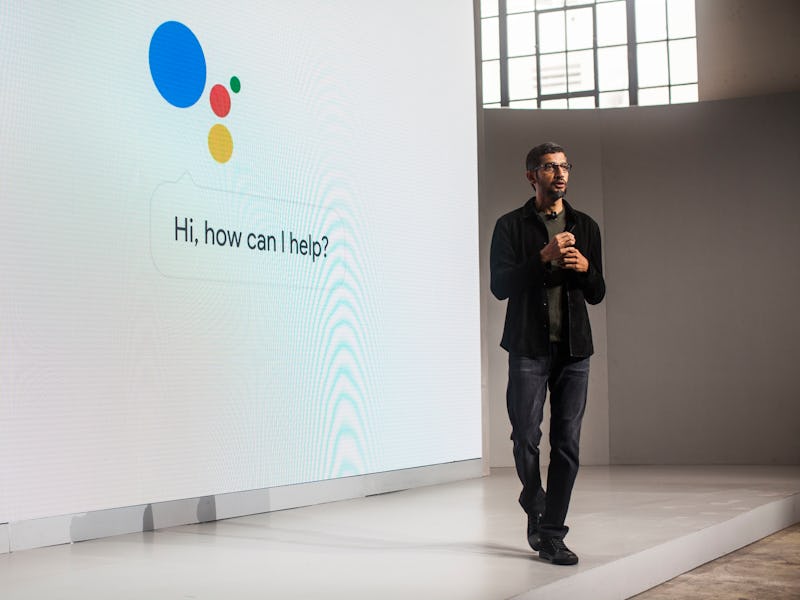Goodbye Search, Google Is Becoming "A.I. First"

Think the name “Google,” and for most, the first thing that comes to mind is the company’s founding, eponymous product: Google Search. But it soon might be A.I.
Google’s first, and still most profitable venture has become so popular for web searches that its name is now the verb to search, and yet in a call to investors Thursday, reporting the company’s Q1 2017 earnings, Google CEO Sundar Pichai said the company’s in translation.
“We continue to set the pace in machine learning and A.I. research,” Pichai said on the Thursday call. “We’re transitioning to an A.I.-first company.”
But just what does it actually mean to transition to an A.I.-first company, and why would Google be willing to upset the system that made it 2017’s most highly valued company in the world?
For Google, becoming “A.I-first” means putting machine learning at the heart of every one of its platforms. Most obviously, there is the integration of the new Assistant service with Google’s Android operating system, and soon Chrome OS as well. Assistant can essentially be understood to be a big, developer-accessible library of all of Google’s most successful A.I. ventures, available on every Assistant-capable phone. The goal is to make machine learning about a user’s schedule, their texting habits, and their personal interests into the core function of a tablet, smartphone, or Chromebook.
OK Google, Get Me a Pizza
Pichai said last year that the ultimate goal of Assistant is to have users ask it to get you a pizza, and to have it produce that pizza on its own, with no further input needed.
All this, and far more expansion in the future, will require better A.I. platforms than the cloud can provide on its own, and Pichai said that would increasingly rely on the company’s recently unveiled its “federated learning” technology. This is one of several competing initiatives to make A.I. run more efficiently mobile devices, allowing more to be done locally with less stress on the battery and data connection. Whether or not federated learning is able to provide what Google needs, the company does have to figure out how to keep increasing the number and sophistication of its machine learning algorithms, without crippling its users’ phones or data connections.
And Google is certainly investing in the tech. Its pure research projects include A.I. auto-encryption, Go-playing super-programs, and even automated art assistants.
Still, Google’s primary platform, far more widely used and profitable than Android, is Search itself, and even in replacing it as the company’s main focus, Google thinks A.I. could make its results more relevant, and its ads more profitable. Not only is the company using A.I. analysis to find large-scale patterns in the search habits of everyone, as well the most favored types of results, but it’s also using A.I. to predict queries. With A.I. in hand, Google’s ability to not only give you want you want but modulate what you want are a whole lot more powerful.
And that gets to the why of the transition away from the ultra-profitable game of search-analysis and ad-targeting: even more ultra-profitable machine analysis of search behavior, and a whole lot more than that, as well. A Search-first model gave Google a hitherto unthinkably easy business model: have people come by the millions to freely give you something, which you then sell to others who already want it. With an A.I.-first model, everything done with even the peripheral involvement of a Google platform of service becomes equally monetizable. Google’s original insight was that it didn’t have to come get your info from you, that you’d bring it to Google on your own. Now, in order to become even more profitable than that allows, Google has reverted to gathering information for itself, albeit with A.I. to do all the actual work.
Whether it’s in mining scalable data out of Assistant voice commands or suggesting likely open parking in Google Maps, machine learning is at the heart of the majority of Google’s newest feature pushes. It’s the technology that will let Google attain its goal of being the first totally personalized global corporation. It’s also the technology that will make Google’s famous founding principle of “Don’t be evil” a whole lot harder to maintain.